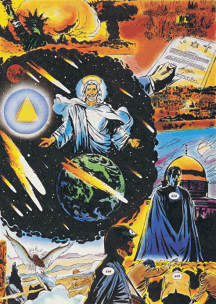
Jan. 1, 2000, has come and gone, and the world—along with most of its computers—remains intact. So what’s a scholar to do after spending the past eight years studying millenniana?
Dr. Theodore Daniels ASC’81 Gr’85, a folklorist who founded the Millennium Watch Institute —a clearinghouse for information about the prophesies of assorted doomsday cults, UFO societies and anti-government militias—says those groups are still promoting their agendas.
As Daniels explains, most organizations never actually pinned a date on their prognostications for a new world order or global shutdown.
“Basically what they say is that it’s going to be any day now.”
Musing in early January about the passage of a quiet New Year’s, what Daniels found most interesting was the hysteria that came from more mainstream groups over the Y2K computer bug, as well as the disproportionate security buildup in various nations in preparation for those who might be “trying to jump-start an apocalypse.”
In Britain, for instance, “MI-5 geared up to prevent attacks against crown and state. The Times of London finally did find a group making preparations. But they were buying up supplies and planning to live in caves in India in 2006”—hardly a threat to national security.
Daniels continues to collect prophetic materials from around the world. (Archived at the Annenberg Rare Book and Manuscript Library of the Van Pelt-Dietrich Library Center, they were the subject of a special exhibit there that ended Jan. 28.) He also has been promoting his newest book, The Doomsday Reader (New York University Press, 1999) and maintaining the institute’s Web site (www.channel1.com/mpr/).
But “I don’t plan on doing this for the rest of my life,” he says. “I’m committed to continuing at least until the end of the year as far as [the library archive] goes. Then I’ll probably move on and do something different.
“Lately, I’ve been getting interested in war—the religious nature of war,” he says. “It’s a huge subject of course. Then again, that’s never slowed
me down.”

